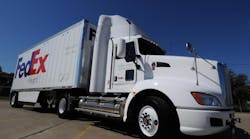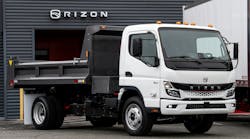If you are a fleet owner who wants to “feel really good about [switching to trucks powered by] LNG, you’ll want crude oil to remain at $100 [bbl] or above,” contends independent consultant Jon T.Gabrielsen in a newly released white paper he authored, titled “An Analysis of Long-Run Economic Scenarios for LNG versus Diesel for Transportation Fuel.”
According to Gabrielsen, president & CEO of J.T. Gabrielsen Consulting, the 18–pg. paper analyzes a “broad spectrum of the available historical, current, and projected future data that can be brought to bear” as to whether liquefied natural gas (LNG) is “likely to be a price-competitive transportation fuel for on-highway trucking and/or railroads” in the years ahead.
Gabrielsen argues that the answer to the “key question” of future “LNG competitiveness for transportation” lies in where crude oil prices will trend.
“Will crude oil prices remain at current historically unprecedented very high levels? Or will they settle somewhat lower as they did for the 20-year period from the mid-1980s to the mid-2000s? This is not to suggest that they would fall back to the $20 to $30 range,” he adds, “but it does consider that they might relax somewhat from current high levels.”
He advises that “it is not the price of natural gas in its gaseous state coming out of the pipe that is the largest driver of the comparative costs of LNG [for freight] transportation.
“It is the full cost of the LNG as it enters the tank associated with the truck or locomotive that is being fueled up” he continues. “For simplification, 80% of the cost at today’s technology and scale [of LNG production] is fixed and only 20% is variable— [which is comprised of] the cost of the natural gas in gaseous state.”
Because of that ratio, Gabrielsen says that a “discussion of future natural-gas prices is conspicuously but intentionally excluded [from the paper]. Because, it has already been shown…that since incoming gaseous natural gas has only a minimal impact on end LNG DGE [diesel gallon equivalent] cost, it is dwarfed in significance…in terms of ultimate LNG competitiveness as a transportation fuel.”
Rather, in the paper he takes pains to point out the three critical factors that must be considered to evaluate the future competitiveness of LNG for transportation:
1. Future Diesel Prices. “What is the most likely future scenario for crude oil pricing and hence diesel pricing?”
2. LNG Conversion Capital Investment Reduction. “How far can the incremental initial capital investment costs to equip trucks and locomotives for LNG be reduced from their current costs?”
3. LNG Fixed Cost Reductions. “How far can the fixed costs for liquefaction of incoming pipeline gaseous natural gas be reduced, thus lowering the breakeven price point line for LNG?”
But the upshot of nearly 20 pages of research and analysis put together by Gabrielsen is that just how competitive a fuel LNG will be for over-the-road trucks-- vs. diesel-- will depend on what the future price will be for crude oil-- and hence for diesel fuel:
· If crude will be predominately above $100/bbl and thus diesel will be at 3.99/gal, “then you will at least break even at a 3-year simple payback, even if no improvements/reductions in incremental initial investment and liquefaction and logistics can be made.”
· If crude at times goes as low as $75/bbl putting diesel at $3.00/gal, “then you will only break even on a 3-year simple payback if it is possible for very significant improvements/reductions in incremental initial investment and liquefaction and logistics costs to be made. These may or may not be possible, in which case LNG would be a net loser at those crude oil/diesel prices.”
· If crude returns to levels prior to 3 to 4 years ago, “when there was 25 years in the $25/bbl. [$1.20/gal diesel] or even just to half of today but double the past 25 years at $50/bbl [$2.10/gal diesel], then converting to LNG could not possibly generate economic benefits.”
Gabrielsen notes that even if crude was to go as low as $50/bbl, putting diesel $2.10/gal, that “would be higher than it has been at any time in history except the past 9 years and it has been in the low $60s as recently as 4 years ago.”
He says the results of his evaluation of LNG’s viability “appears to be a perfect example of where one should try out the LNG technologies, continuously keep a small portion of one’s fleet LNG to develop experience and perfect/optimize the use of the technology, while closely watching the crude oil pricing environment to determine whether or not to embrace LNG in a big way or not.”
He adds that the data and analysis presented in his paper would enable fleet owners “to make the right decisions” depending on what the future price for crude oil, and thus for diesel, winds up being.
Gabrielsen is an independent consulting professional with over 35 years of experience working with global companies in a broad array of industries, including with transportation OEMs, suppliers and aftermarket firms.
He can be reached via email at [email protected]or by phone: (Office) 770-803-0003 and (Mobile) 678-642-0408.



